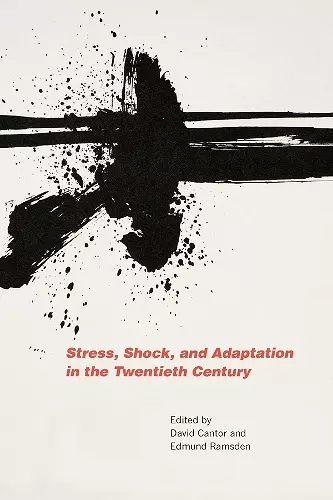Stress, Shock, and Adaptation in the Twentieth Century
David Cantor editor Edmund Ramsden editor
Format:Hardback
Publisher:Boydell & Brewer Ltd
Published:28th Feb '14
Currently unavailable, and unfortunately no date known when it will be back

This edited volume brings together leading scholars to explore the emergence of the stress concept and its ever-changing definitions since the 1940s. Stress is one of the most widely utilized medical concepts in modern society. Originally used to describe physiological responses to trauma, it is now applied in a variety of other fields and contexts, such as in the constructionand expression of personal identity, social relations, building and engineering, and the various complexities of the competitive capitalist economy. In addition, scientists and medical experts use the concept to explore the relationship between an ever-increasing number of environmental stressors and the evolution of an expanding range of mental and chronic organic diseases, such as hypertension, gastric ulcers, arthritis, allergies, and cancer. Thisedited volume brings together leading scholars to explore the emergence and development of the stress concept and its definitions as they have changed over time. It examines how stress and closely related concepts have been used to connect disciplines such as architecture, ecology, physiology, psychiatry, psychology, public health, urban planning, and a range of social sciences; its application in different settings such as the battlefield, workplace, clinic, hospital, and home; and the advancement of techniques of stress management in a number of different national, sociocultural, and scientific locations. Contributors: Theodore M. Brown, David Cantor, Otniel E. Dror, Rhodri Hayward, Mark Jackson, Robert G. W. Kirk, Junko Kitanaka, Tulley Long, Joseph Melling, Edmund Ramsden, Elizabeth Siegel Watkins, Allan Young. David Cantor is acting director, Office of History, National Institutesof Health. Edmund Ramsden is Wellcome Trust University Award Research Fellow at the School of History, Queen Mary, University of London.
[A] very good book. * ISIS JOURNAL *
Stress, Shock, and Adaptation intersects with earlier studies . . . yet opens out differently the ways in which we can approach the history of emotions, as well as medical understandings of twentieth-century feeling through the category of 'stress.' In doing so the editors and contributors enrich not only our knowledge, but also the ways in which we can conceptualize and investigate emotions in the past. * BULLETIN OF THE HISTORY OF MEDICINE *
The editors.are to be congratulated on assembling a diverse collection of essays executed to a high standard of scholarship. will be of great interest to medical historians as well as psychiatrists, psychologists, and others studying the topic of stress. * HISTORY OF PSYCHIATRY *
In this first in-depth collection on stress, editors David Cantor and Edmund Ramsden have assembled scholarship of the highest standard by leading experts in their chosen fields. Stress, Shock, and Adaptation will be of great interest to historians of the human sciences, as well as psychiatrists, psychologists, and others concerned with the topic of stress. A most welcome contribution. -- Ruth Leys, Henry Wiesenfeld Professor of Humanities, Johns Hopkins University
A valuable collection. . . . Brings further insight on the ways stress-related terms initially proper to psychology and psychiatry . . . [have] evolve[d] to assume new meanings, expand[ing] into adjacent social fields and [becoming] popularized in the public discourse. * VESALIUS *
ISBN: 9781580464765
Dimensions: unknown
Weight: 714g
376 pages